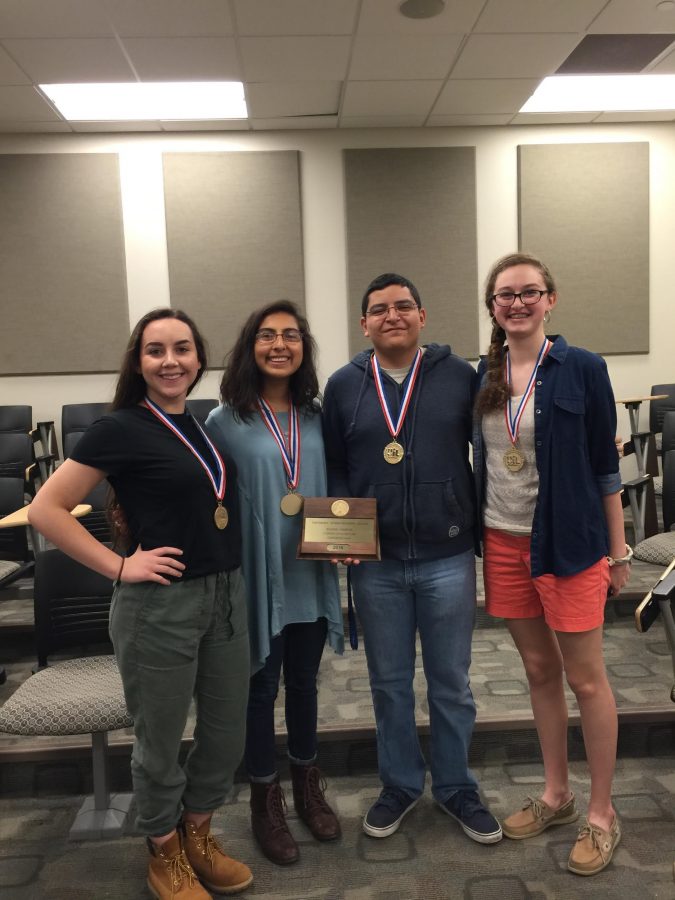It’s lit (crit)
Literary Criticism team reads and writes their way to competition
February 14, 2017
Polyptoton. Anacrusis. Hubris.
These terms may seem strange, but they’re only a few of the odd terms that you’ll find in the Handbook to Literature – one of the books that is considered fair game to any and all literary criticism competitors.
Literary Criticism, coached by Mrs. Roeming, is a literary analysis UIL event. Every year, they are given a reading list, which consists of a novel, a play, and a set of poems.
This year’s selection included The Joy Luck Club by Amy Tan, Twelfth Night by Shakespeare, and a series of poems by Rudyard Kipling. Luckily, Mrs. Roeming and the students have enjoyed this year’s selections.
“Sometimes we like the selections, sometimes we don’t,” Roeming said. “We like the selections this year. Twelfth Night is a little hard to get through, but it’s comedy. Joy Luck Club is a good read, but there are a lot of characters whose names are all in Chinese. We’re finding that Rudyard Kipling is a little twisted and dark.”
The obvious assumption to make is that competition is easier when the students enjoy the books; however, Mrs. Roeming thinks just the opposite.
“It makes competition harder, because everyone else probably likes it too,” she said. “You compete with a lot of other people, and how they do determines how you do.”
This year’s team consists of six students from a variety of classes: one freshman, two sophomores, Abigail Leinhauser and Victoria Permann, one junior, Mariana Rios, and two seniors, Emily Moore and Christie Basson.
“It makes my job tough, because I have to narrow it down to only four to compete at district,” Roeming said.
Each year, this team of four goes to compete – and their record just keeps getting better and better. Recently, the team went to an invitational in Joshua where they took first through fifth place.
“We’ve had students go to state every year since I’ve been coaching,” Roeming said. “We hadn’t placed until last year when Mariana Rios placed at State as a sophomore.”
The competition itself is a 90 minute, 4-part test.
“The first part is a 30-item multiple choice worth one point each over anything from the Handbook to Literature,” Roeming said. “The second part is multiple-choice questions over the reading lists from the year. The third part is called ‘Ability in Literary Criticism,’ in which you’re given poems you haven’t seen before, and they ask you literary criticism term questions about it. The final part is the tie-breaker essay – they only look at it if there’s a tie, but if you don’t write it, you’re disqualified.”
Roeming said that because of the information that students must learn, Literary Criticism is “one of the hardest UIL academic events.”
“Anything in the Handbook to Literature is fair game – it includes an alphabetical list of all literary terms, literary groups in British and American history, literary periods, major authors and their works, major historical events, and all of the Nobel Prize and Pulitzer Prize winners.”
While this may seem like a massive amount of information, Roeming still tries to make everything fun and light-hearted when it comes to practice.
“Most of the time, I approach it by saying ‘I don’t even know everything,’” she said. “We make it fun – I’ve created a game board, where if you land on a certain color, it’s a certain kind of question. We read the plays out loud and have character parts so we get to enjoy it. We do accents. I try to make it fun and make it a family, so that you retain kids.”
Despite everything, Mrs. Roeming does try to make things less overwhelming for her students. The pressure can still get to some students.
“It can get overwhelming.” she said. “I lost one girl who was overwhelmed by it her freshman year. She told me last year, when I had her as a junior, that she regrets not staying in it.”
Mrs. Roeming will be looking for new students next year – and any grade level is more than welcome to try to join.
“My goal is to have one per grade level,” Roeming said. “I always try to get feedback from Mrs. Clemmer, the 8th grade Pre-AP English teacher, and Coach Mayes, 9th grade Pre-AP English teacher, to borrow one new freshman a year. If I don’t retain them, because it’s an overwhelming event or they get busy or choose another event, I try to look for others from that grade level.”
This event, obviously, requires a certain kind of person. Roeming has given everyone an idea of what kind of students she’s looking for on the team.
“They’ve got to be a good memorizer, love reading and be willing to read above and beyond what you have to read in school, insightful about literature, and know a lot of the terms and devices,” Roeming said.
To any students that are interested in Literary Criticism, stop by room 301 and see Mrs. Roeming.







